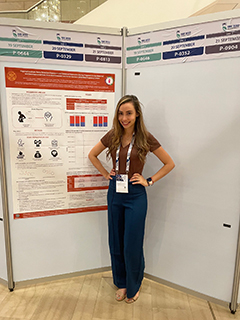
Hernandez-Castro next to her poster at the annual meeting of the International Society of Exposure Sciences. (Photo courtesy of Ixel Hernandez-Castro).
Ixel Hernandez-Castro, a doctoral student in epidemiology in the Keck School of Medicine at the University of Southern California, spoke with NIEHS about her journey as a researcher with the Maternal and Developmental Risks from Environmental and Social Stressors (MADRES) center, one of the NIEHS-funded Centers of Excellence on Environmental Health Disparities Research.
She shares how she came to study the ways environmental exposures and social factors can negatively affect babies and mothers.
- What is the focus of your research at the MADRES Center?
My research at the MADRES Center predominately focuses on evaluating the effects of various environmental chemicals on early neurodevelopment in children. I also study the impacts of environmental chemicals and psychosocial stressors on mental health symptoms in mothers. More recently, I began looking at the impacts of mixtures of flame-retardant chemicals, specifically organophosphate esters, also called OPEs, on neurodevelopment during infancy and early childhood. - How did you become interested in this work?
Because I grew up in California's agricultural Central Valley, I am personally familiar with the disproportionately high rate of negative health outcomes in communities like my own. When I grew older, I was particularly struck by the routine use of potentially neurotoxic agricultural chemicals. These chemicals are applied too close to susceptible and vulnerable populations, often with few or no protective measures in place.
Ever since, I have been interested in understanding the impacts of early chemical exposures on adverse neurodevelopmental outcomes. With my research, I hope to identify risk factors we can control, which could advance risk-assessment opportunities and potential interventions. - Tell us about your recent publication and why it is important to your field.
I recently published the results of a study that linked prenatal exposure to OPE metabolite mixtures and neurobehavioral effects among 36-month-old children. Our findings contribute to the growing number of studies indicating potentially neurotoxic effects from these widely used flame-retardant chemicals. - Tell us about a recent presentation you gave and what it meant to you.
In August 2023, I attended the annual meeting of the International Society of Exposure Sciences and presented on the association between prenatal OPE exposures and motor development across infancy in the MADRES cohort. The presentation was a great opportunity to discuss findings across multiple cohorts from the Environmental influences on Child Health Outcomes program, to share my research, and to network with scientists across the exposure science field! - What factors contributed most to your growth as a researcher in your time as a MADRES Center doctoral student and researcher?
The collaborative environment within the MADRES Center has provided me with the opportunity to learn from a variety of incredible scholars with different specialties. They have taught me a host of skills that have become integral to my research! - What advice do you have for other early career investigators?
Surround yourself with a supportive group of early career investigators within and outside of your field. Research can sometimes feel like a very isolating experience, but having a community of supportive scholars alongside you can help combat that!


